At Rosemont Media, we’re passionate about working with dental professionals to develop customized SEO strategies. Whether you’re a dentist, orthodontist, periodontist, prosthodontist, or another specialty, we encourage you to contact us to schedule an initial meeting with our friendly and knowledgeable team. Our SEO specialists can help you find the most beneficial strategies for your website and budget.
- What is Dental SEO?
- Guide to On-Page & Off-Page SEO
- GENERATIVE ENGINE OPTIMIZATION (GEO)
- Keywords for Dental SEO
- Content Marketing for Dental SEO
- Customized Website Design for Dental SEO
- Local SEO Strategies
- High-Quality Backlinks for Dentists
- Dental SEO Cost
- Why Hire an SEO Agency?
- Other Frequently Asked Questions
What is Dental SEO?
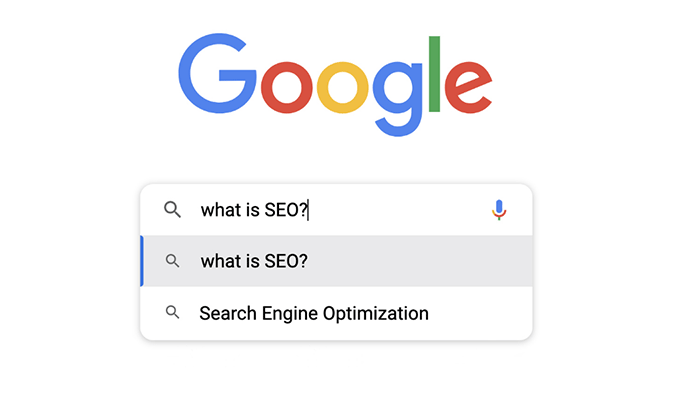 Dental SEO is the process of optimizing a dentist’s website to make it more visible in search engine results. Due to the competitive nature of dentistry, SEO for dental practices requires a comprehensive and strategic approach to not only reach but stay at the top of search engines like Google. These “organic” rankings are influenced by many components — both on and off a dental website.
Dental SEO is the process of optimizing a dentist’s website to make it more visible in search engine results. Due to the competitive nature of dentistry, SEO for dental practices requires a comprehensive and strategic approach to not only reach but stay at the top of search engines like Google. These “organic” rankings are influenced by many components — both on and off a dental website.
Effective dental SEO involves conducting thorough keyword research to identify what potential patients are searching for and creating engaging, informative content tailored to these queries. Local SEO is another key element for dentists, as it ensures your practice ranks highly in local results, positioning your name in front of prospective patients in the area. Additionally, building a robust network of quality backlinks and maintaining a strong presence in local directories and Google Business Profiles are vital components of a successful strategy.
From keyword research and content development to local SEO and link building, Rosemont Media specializes in dental SEO strategies that blend technical expertise with a deep understanding of the dental industry. Our approach is not just about improving search engine rankings but establishing your practice as an authority. By optimizing both on-site and off-site SEO elements, we help dental practices like yours achieve high visibility online while engaging with their target audience to improve patient acquisition and retention.
Guide to On-Page & Off-Page SEO for Dentists
On-Page SEO Elements
On-page SEO elements are essential for optimizing a dental website to rank well in search engine results and attract potential patients. Here are some key on-page SEO elements that can be extremely useful for dental websites:
- Interlinking: Linking to relevant pages on your website can help improve user experience and boost your search engine ranking.
- Page Titles and Descriptions: These should be optimized for your target keywords and help grab people’s attention.
- Header Tags (H1, H2, H3, etc.): Use these tags to structure your content and make it easier for search engines to understand.
- URL Structure: Your website’s URL structure should be clean and easy to read.
- Images and Alt Text: Use high-quality images with descriptive alt text.
- Schema Markup: This code helps search engines understand your website’s content.
- High-Quality Content: Create fresh, informative, and engaging content that your target audience will find valuable.
- Page Load Speed: Make sure your website loads quickly on all devices.
Off-Page SEO Elements
Off-page SEO elements are about building trust and authority, while enhancing your online visibility and attracting more patients. They go beyond your website and focus on enhancing your reputation and digital presence. Key off-page SEO for dentists include:
- Local Listings and Citations: List your practice on relevant directories like Google Business Profiles and Yelp with consistent practice information.
- Reviews and Reputation Management: Encourage patients to leave reviews on popular platforms like Facebook, Yelp, and Google.
- Backlinks from Authoritative Sites: Gain backlinks from reputable dental or health websites through collaborations or creating shareable content.
- Social Media Presence: Actively engage and share informative content on social media platforms.
- Email Marketing: Communicate with a targeted subscriber list through regular email blasts and newsletters.
- Forum Participation: Engage in online forums and Q&A sites related to dental health.
What Is Generative Engine Optimization (GEO) for Dental Websites?
Generative Engine Optimization (GEO) is an emerging field in digital marketing that involves optimizing content to improve visibility in AI-driven search engines. For dental websites, GEO goes beyond traditional SEO strategies by aligning content with AI models, like Gemini, that generate direct answers to user queries, helping to improve visibility and engagement across various digital platforms.
Incorporating GEO into your dental practice’s SEO strategy can significantly enhance your online presence by optimizing content for both AI-driven search engines and user experience. Below are some examples of how GEO can be applied:
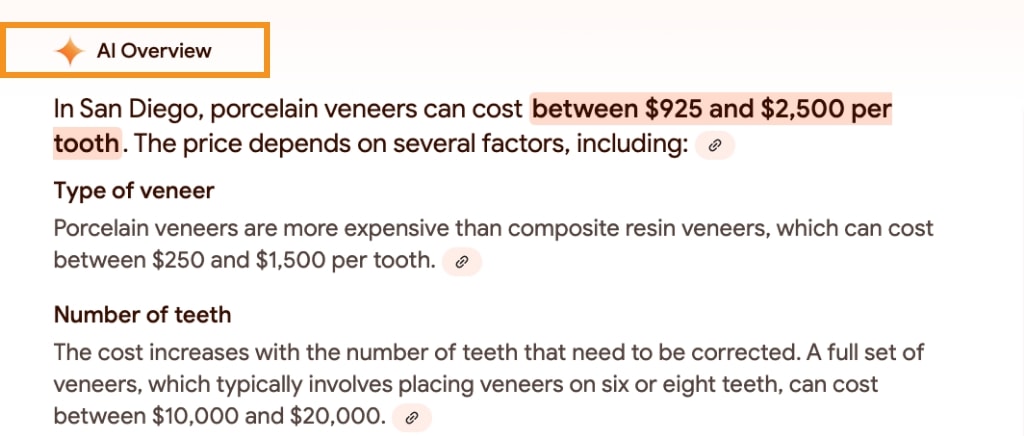
AI Overviews
AI tools generate concise, relevant summaries directly within search results by analyzing multiple data sources, search trends, user behavior, and competitor strategies. Optimizing for AI Overviews ensures your website stays competitive and aligned with what potential patients are searching for, while also requiring regular content updates to maintain accuracy.
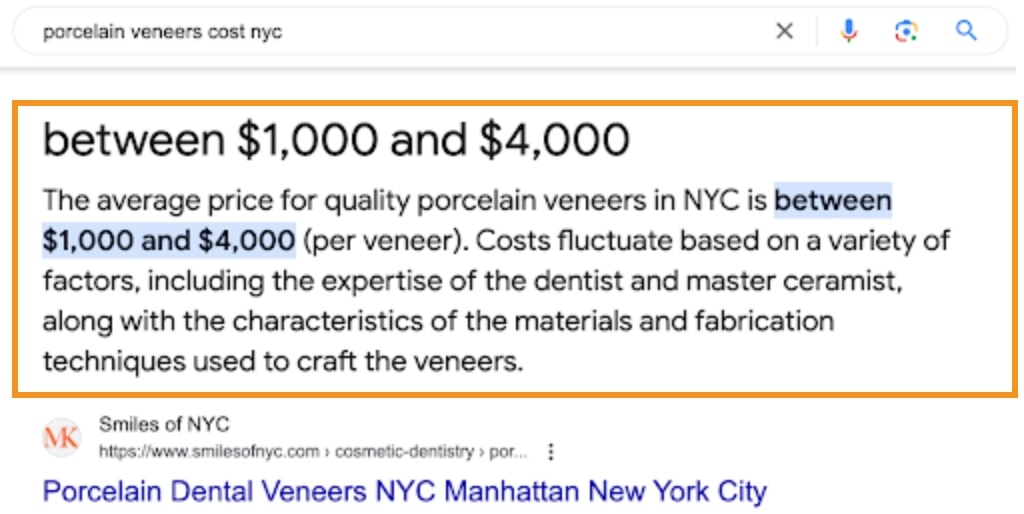
Featured Snippets
GEO can help in structuring your website’s content to appear in featured snippets — the highlighted answers at the top of Google’s search results. By crafting content that is direct, informative, and well-structured, your dental website can capture these valuable positions, leading to increased click-through rates.
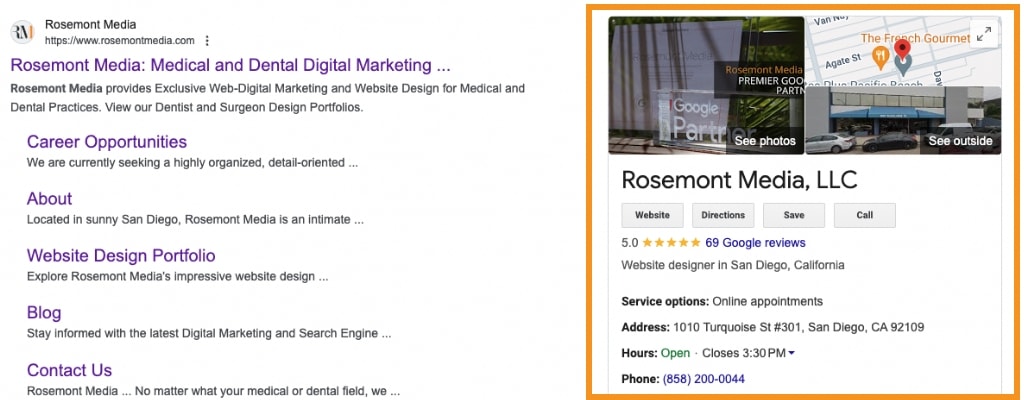
AI-Powered Knowledge Panels
Utilizing AI, GEO can optimize your practice’s information to be featured in Google’s Knowledge Panels. These panels provide concise, authoritative summaries about your dental practice, drawing from various sources and enhancing your credibility while making it easier for patients to find key information.
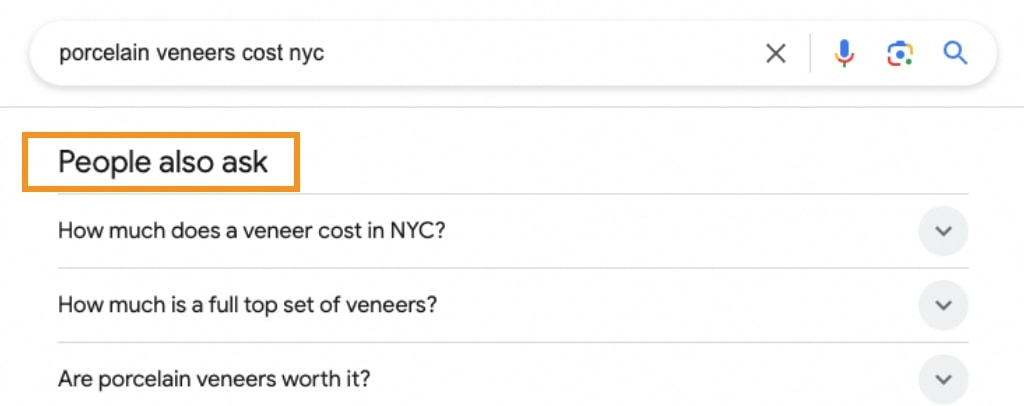
People Also Ask (PAA)
GEO can help your content appear in the “People Also Ask” sections of search results. By answering common questions related to dental procedures or services, your website can gain additional exposure and authority in your niche.
Voice Search Optimization
With the rise of voice-activated devices, GEO ensures that your content is optimized for voice search. AI-driven tools can tailor your content to match the natural language used in voice queries, helping your practice rank higher when patients ask questions via voice-activated assistants.
By integrating Generative Engine Optimization into your dental SEO strategy, you can stay ahead of the curve, ensuring that your practice remains highly visible and accessible in an increasingly AI-driven digital landscape.
How to Use Keywords in Dental SEO
If you’ve spent any time in the world of digital marketing, you’ve probably heard “SEO” and “keywords” paired together on more than one occasion. That’s because dental keywords (or the terms and phrases used most often in searches) play a crucial role in SEO, and taking full advantage of their power can dramatically boost a dental website’s visibility. Our digital marketing experts not only perform thorough keyword research for dental clients, but are proficient in subtle, natural, and effective keyword placement to benefit both search engines and readers.
Importance of Content Marketing for Dental SEO
Content is king in the realm of SEO. Thanks to “Panda” – one of Google’s major updates to its search algorithm – significant value has been placed on the quality and originality of a website’s content. In short, sites that have a steady flow of fresh, useful content are generally rewarded in search results, whereas those who have stale, shallow content may experience a decline in their content marketing success.
Implementing quality content on your website benefits potential patients in your area as much as your search engine rankings. After identifying opportunities for improvement in your marketing strategy, some types of content you can create for your dental website may include:
- Website pages: Populating your website pages with a steady stream of informative, helpful, and compelling content can allow you to target highly-searched Google queries while demystifying patients’ most pressing questions about their dental treatment. Consider showcasing your top treatments on a custom design/layout to increase page quality and make your content more visually appealing. Website pages offer endless opportunities for expansion and updates, helping ensure your site is continually crawled by Google.
- Blog posts: Share your expertise on dental topics with readers, and answer patients’ most frequently asked questions about a given treatment. Blogs offer a natural way to target popular keywords while working to drive traffic back to your top procedure pages.
- Patient testimonials: Let your patients tell you what they love about your practice. Testimonials and online reviews demonstrate the quality of care provided by your dental team, and help turn curious visitors to your site into happy, satisfied patients.
- Press releases: PRs offer the ability to generate authoritative backlinks, establish your credibility as a dentist in your area, reinforce your brand identity, and optimize local SEO. In addition to announcing newsworthy events at your practice, press releases can be authored to target high-volume keywords and drive traffic back to your site. This yields both direct and indirect benefits for dental SEO.
With an individualized content marketing plan, you can make sure a continuous stream of new, valuable content (e.g. page updates, blog entries, news releases, etc.) is being added to your website regularly, ultimately helping to establish your site as a reliable resource for viewers while boosting your search result rankings and online visibility.

How Do I Optimize My Dental Website for Local SEO?
“Local SEO” refers to techniques used to improve a dental practice’s online visibility in search engines like Google, Bing, and Yahoo. The primary goal of local SEO is to ensure that your practice appears in local search results when potential patients in close proximity to your practice search for services or procedures you offer. As part of your unique SEO plan, our team can create localized pages for your site, write and optimize your Google Business Profile, manage your citations in local directories, and maintain a strong social media presence for your dental practice, among other proven methods to improve your local reputation.
At Rosemont Media, we take a comprehensive approach to local SEO, incorporating key strategies such as:
- Google Business Profile (GBP) optimization
- Location-specific landing pages
- Local directory and citation management (to ensure Name, Address, and Phone number, or “NAP,” consistency)
- Online review and reputation management
- A strong social media presence for your dental practice
- Technical SEO and mobile optimization
By implementing these strategies, our team can help position your practice at the top of local search results, making it easier for patients in your community to find and choose your oral healthcare services.
How to Acquire High-Quality Backlinks for Dentists
A backlink, also known as an inbound link or incoming link, is a hyperlink from one website to another. It represents a way for users to navigate between different web pages on the internet, essentially serving as a vote of confidence or an endorsement of the linked website’s content. Acquiring backlinks from reputable and relevant sources (e.g. the American Academy of Cosmetic Dentistry, the Better Business Bureau, etc.) can significantly improve your website’s authority and search engine ranking. As such, backlinks are frequently counted among the most valuable parts of any practice’s or business’s SEO strategy.
Backlinks are a critical factor in search engine algorithms, such as Google’s PageRank. In SEO, the quantity, quality, and relevance of backlinks to your website can influence your site’s authority and how well it ranks in search engine results. With this in mind, many website owners and SEO professionals actively work to acquire high-quality, natural backlinks to improve their site’s search engine visibility and organic traffic.

How Much Does Dental SEO Cost?
The cost of dental SEO services can vary significantly depending on several factors, including the scope of the SEO campaign, the competitiveness of the local dental market, and the specific services included in the package. The services included in your SEO package can range from basic on-page optimization and local SEO to more advanced strategies like content creation, link building, and reputation management.
The initial cost of content and on-page SEO elements for a new dental practice website can range from around $7,500-$15,000 and monthly dental SEO services can range from approximately $750 to $3,000+, depending on these factors. Keep in mind that SEO is an ongoing process, and results may take some time to become apparent, so consider it as a long-term investment in your dental practice’s online presence and marketing. When you work with our team, we’ll carefully evaluate your practice’s specific needs and objectives when developing your personalized SEO strategy.
Why Hire a Dental-Specific SEO Agency?
In an ever-evolving digital world, the most successful dental websites enlist the help of digital marketing professionals to stay afloat of the latest industry updates. SEO agencies, such as Rosemont Media, can create a well-rounded strategy that includes on-page optimization, off-page SEO (link building), content creation, technical SEO, and local SEO tactics, tailoring the entire plan to your practice’s specific needs. SEO is a time-consuming and continuous process; by outsourcing SEO to an agency, you can focus on your core dental practice while the experts handle your online marketing efforts, potentially saving valuable time and resources.
When choosing an SEO agency, be sure to do your research and select one with a good track record, relevant experience (preferably expertise) in the dental industry, and a clear understanding of your local market. Quality SEO can be a substantial investment, but it can yield significant returns in terms of increased website traffic, patient inquiries, and revenue for your dental practice.
Learn more about Why You Should Work With a Marketing Agency That Specializes in Your Field.
Other Frequently Asked Questions About Dental SEO
Why Do My Rankings Fluctuate in Search Engines?
Your dental website’s ranking in search results can change due to several reasons. Key factors include search engine algorithm updates and the competitive nature of SEO, where improvements by other practices can affect your position. Changes in user search behavior, updates to your own website, and shifts in Google's local search algorithm also play significant roles. Keep in mind that the rankings you see can also change based on Google’s personalized results, a system that tailors results based on your browser history, where you’re searching from, and the device being used.
If you notice a sudden drop in ranking, your site may have been affected by a recent search engine algorithm update or a potential search engine penalty. The best course of action if you see a dramatic change in where your site is positioned in the SERPs is to take a systemic approach to diagnose and address the possible cause. Learn more about this in our guide to recovering your ranking in search results.
What Are Common SEO Mistakes My Dental Practice Should Avoid?
Especially in the early stages of building your dental website, it’s common to make SEO mistakes that may prove more harmful than helpful to the site’s long-term success. Take care to avoid mistakes such as:
- Employing obsolete or questionable tactics (e.g. keyword stuffing or using clickbait)
- Neglecting to track your progress with regular reports to inform your strategy
- Publishing mediocre (or even duplicate) content to your pages
A reputable SEO firm can work with you to avoid falling into these traps while keeping you informed about more effective – and ethical – strategies. For this reason and countless others, it’s imperative that you trust your marketing to a trustworthy company and steer clear of SEO professionals using questionable tactics.
How Can I Tell if My Dental SEO Efforts Are Working?
Factors such as competition, the age of your site, and the quality of the resources you use can all impact the success and speed of your SEO results. While most dental websites see an improvement in performance after approximately four to six months, keep in mind that the SEO process is ongoing and requires gradual, consistent effort.
At Rosemont Media, it’s part of our job as SEO experts to measure the effectiveness of your SEO strategy. In order to ensure your strategy is working as it should, we’ll perform regular reports and check-ins to track progress. Our team will also use tools such as Google Analytics and Google Search Console to monitor your site’s SEO performance.
What Role Does Social Media Play in Dental SEO?
Social media can play a significant, albeit indirect, role in dental SEO. While social media platforms themselves do not have a direct impact on search engine rankings, they can influence various SEO-related factors and contribute to the overall online presence of your dental practice. SEO and social media can work together to boost a practice’s brand awareness, promote engagement with patients, increase click-through rate (CTR), and much more.
Learn more about social media marketing for dentists.
Do Dentists Need Both SEO and PPC?
In short, SEO and PPC (or “pay per click”) serve different purposes when it comes to attracting new patients and improving brand awareness. SEO is a long-term, organic approach that builds trust and authority, while PPC (in which advertisers pay a fee each time one of their ads is clicked by a user) offers immediate visibility and precise targeting.
How Often Should Dental Websites Update Their Content?
Dentists should consistently update their pages with fresh, new content in order to ensure search engines continue to crawl their website. This means Google “visits” your site more often, most likely resulting in higher page rankings. While some pages may remain more static than others (such as the “Contact Us” page), frequent expansions to page content give potential patients up-to-date information on your practice or their treatment-of-interest — high-value content that search engines like Google certainly take notice of.
How Does Local SEO Differ from General SEO for Dentists?
Whereas SEO on a broader scale aims to boost visibility for general queries related to your practice, local SEO works to position your clinic at the forefront of SERPs (Search Engine Results Pages) for patients searching in your nearby area. Local SEO for dentists leverages the increased visibility in your region to enhance patient conversion rates and catalyze practice growth.
In the modern digital marketing world, SEO is more powerful to the success of your ongoing dental marketing efforts. However, paid search is a highly beneficial complement to SEO, as it gives your practice more control over when and where it shows up in search results. Together, SEO and PPC can effectively position your practice in front of your targeted audience and provide a significant increase in conversion rates.
Should I Implement Multilingual SEO for My Dental Website?
Implementing multilingual SEO can enhance accessibility and attract more potential patients. At Rosemont Media, we often work with dental clients who have added Spanish-language pages to better connect with their local communities. Optimizing content in multiple languages allows your practice to rank for relevant searches in each language, improving the user experience for non-English speakers. Moreover, a well-executed multilingual SEO strategy can help increase visibility, engagement, and conversions, ensuring your website effectively reaches and serves a broader audience.
Do I Need to Optimize for Dental Patients Using Voice Assistants?
As more people turn to voice assistants like Siri, Google Assistant, and Alexa, optimizing your dental website for voice search has become essential. Patients often use natural, question-based queries when searching for a dentist, such as, “Who is the best cosmetic dentist near me?” or “Where can I get Invisalign® in [city]?”. As GEO-targeting strategies continue to evolve, our team stays ahead of the curve, leveraging the latest voice search optimization techniques to help our clients reach more potential patients.


